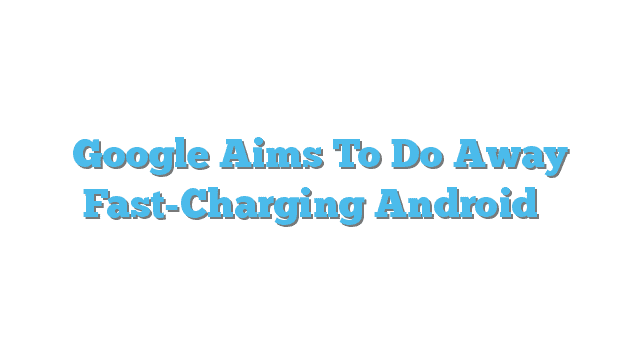Tech giant Google is aiming to ensure no one is using so-called “fast-charging” technology on Android devices, according to the latest version of the Android Compatibility Definition for Android Nougat. That means that Google doesn’t want original equipment manufacturers producing mobile devices that ship with the Android operating system to offer fast-charging technology.
That would include a wide array of charging standards currently on the market, including Qualcomm Quick Charge, OnePlus Dash Charge, Motorola Turbo Charging, and Huawei SuperCharge. While Google has stopped short of outright prohibiting manufacturers from supporting proprietary charging standards, the compatibility document nonetheless sends a strong message about the company’s position on the issue.
Strongly Recommended, but May Be Required
The recommendation applies to devices that charge themselves using a USB-C (or Type C) connection. “Type-C devices are strongly recommended to not support proprietary charging methods that modify Vbus voltage beyond default levels, or alter sink/source roles as such may result in interoperability issues with the chargers or devices that support the standard USB Power Delivery methods,” Google said in the compatibility document.
However, the company has left open the possibility that it might outright prohibit support of proprietary charging technologies on Android devices in the future. “While this is called out as ‘strongly recommended,’ in future Android versions we might require all type-C devices to support full interoperability with standard type-C chargers,” according to Google.
Instead of using proprietary systems, Google wants manufacturers to agree to use the USB Power Delivery technology as a single industry standard for USB-C charging. One of the big issues for Google is the question of interoperability. Different charging technologies can require the use of different chargers, meaning not every USB-C charger would necessarily work on every Android phone. And using the wrong charger could potentially damage the phone.
Multiple Voltage Levels
That is the kind of nightmare scenario that Google wants to avoid for the Android platform. Instead of each manufacturer producing its own fast-charging technology, Google wants a single standard that guarantees that chargers that work on a Samsung phone will also work on a Huawei or Qualcomm.
The main problem Google seems to be focusing on is the possibility that competing proprietary charging technologies may use modified voltage levels for their devices. But not every chipset is compatible with the same range of voltages. Potentially, that could lead to a user damaging his phone by inadvertently using a USB-C charger that delivers more voltage than the phone can handle. A user with multiple Android phones made by different manufacturers might also have to carry around a different charger for every device.
Google’s announcement does not mean that it is shutting the door on fast-charging protocols altogether. The Power Delivery standard itself is considered a fast-charging technology and Google is already supporting that standard on its own Pixel phones.



![[Interview] The Technologies Bringing Cloud-Level](https://loginby.com/itnews/wp-content/uploads/2025/11/1763822314_Interview-The-Technologies-Bringing-Cloud-Level-238x178.jpg)



